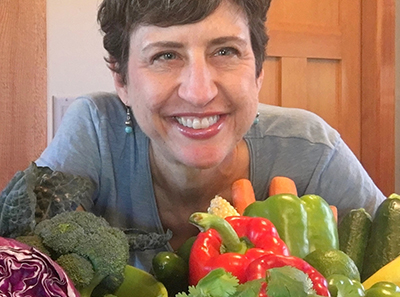Everyday diet influences current health and the potential for later illness. The unbalancing health effects of overeating and undereating can take their toll in numerous ways, resulting in nutritional disorders that cause digestive issues and chronic disease. Food choices resoundingly do matter, and it is never too late to treat and prevent disease. Get back into balance with dietary and lifestyle practices that can be implemented today.
 1. Consume whole foods. Eat foods that are as close to nature as possible versus highly processed foods, which are high in calories but void in nutrients. High concentrations of fat, salt and sugar result in bodily systems having to work overtime to maintain balance. Although these foods are calorically dense, the body may starve for micronutrients, which ironically results in a state of malnourishment. Whole foods are plant foods in which nothing is added or taken away (or very minimally). Thus, eat an apple versus a slice of apple pie.
1. Consume whole foods. Eat foods that are as close to nature as possible versus highly processed foods, which are high in calories but void in nutrients. High concentrations of fat, salt and sugar result in bodily systems having to work overtime to maintain balance. Although these foods are calorically dense, the body may starve for micronutrients, which ironically results in a state of malnourishment. Whole foods are plant foods in which nothing is added or taken away (or very minimally). Thus, eat an apple versus a slice of apple pie.
 2. Choose the right foods. Design your plate with four healthful food groups: vegetables, fruits, whole grains, and legumes (beans, peas, lentils). These foods naturally satiate, provide energy, and promote good digestion due to their fiber content. Instead of making plant foods a side dish, place them front and center on the plate so that stomach sensors will correctly message the brain when full.
2. Choose the right foods. Design your plate with four healthful food groups: vegetables, fruits, whole grains, and legumes (beans, peas, lentils). These foods naturally satiate, provide energy, and promote good digestion due to their fiber content. Instead of making plant foods a side dish, place them front and center on the plate so that stomach sensors will correctly message the brain when full.
 3. Don’t obsess over super foods. Broccoli, blueberries, oats, and ground flax seed are definitely beneficial when consumed frequently due to high nutrient density and protective health qualities. However, just as important is to eat a varied diet of all plant foods. Consume the rainbow of choices, since the colors represent the myriad of vitamins, minerals and phytonutrients they provide. Plants also aide digestion, so incorporate ginger, cinnamon, turmeric, peppermint, and fennel, along with other spices and herbs for health-soothing benefits.
3. Don’t obsess over super foods. Broccoli, blueberries, oats, and ground flax seed are definitely beneficial when consumed frequently due to high nutrient density and protective health qualities. However, just as important is to eat a varied diet of all plant foods. Consume the rainbow of choices, since the colors represent the myriad of vitamins, minerals and phytonutrients they provide. Plants also aide digestion, so incorporate ginger, cinnamon, turmeric, peppermint, and fennel, along with other spices and herbs for health-soothing benefits.
 4. Embrace the holistic approach. Remember, foods work synergistically versus in isolation. While vitamins and minerals have specific roles in the body, there is no need to focus on every bite to ensure proper nutrition when adequate calories are consumed from varied plant sources. Note: Vitamin B12 and Vitamin D supplementation helps ensure complete nutrition for those who eat entirely plant-based and who experience digestive absorption issues due to age or disease. Be sure to talk to your doctor about annual blood testing and before starting supplements to receive proper dosage.
4. Embrace the holistic approach. Remember, foods work synergistically versus in isolation. While vitamins and minerals have specific roles in the body, there is no need to focus on every bite to ensure proper nutrition when adequate calories are consumed from varied plant sources. Note: Vitamin B12 and Vitamin D supplementation helps ensure complete nutrition for those who eat entirely plant-based and who experience digestive absorption issues due to age or disease. Be sure to talk to your doctor about annual blood testing and before starting supplements to receive proper dosage.
 5. How to eat is just as important as what to eat. Digestion is a complicated process, involving many steps. The body requires time to digest food correctly. Therefore, avoid mindless snacking and unfocused mealtimes (eating while doing other things). Instead, allow the body to correctly metabolize food by chewing food slowly, eating meals with intention, and establishing regularly spaced mealtimes. To also assist with better quality sleep, avoid eating 3 - 4 hours before bedtime.
5. How to eat is just as important as what to eat. Digestion is a complicated process, involving many steps. The body requires time to digest food correctly. Therefore, avoid mindless snacking and unfocused mealtimes (eating while doing other things). Instead, allow the body to correctly metabolize food by chewing food slowly, eating meals with intention, and establishing regularly spaced mealtimes. To also assist with better quality sleep, avoid eating 3 - 4 hours before bedtime.
Start where you are: be mindful of what you eat and how you eat. Mealtime and dietary food choices should be enjoyed and embraced when part of a healthy, balanced lifestyle.
Learn more from Chris at Plant 2 Platter®, attend the Sedona VegFest every January, and participate in Healthy Basics Classes at Verde Valley Medical Center-Cottonwood starting January 30th.








